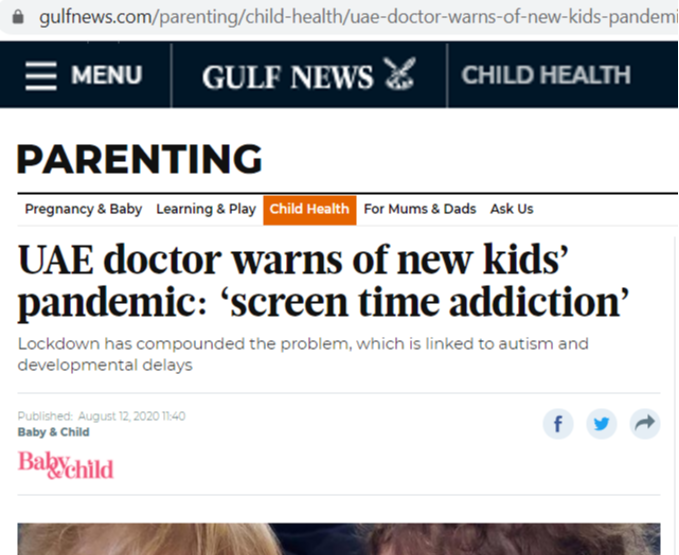Hayati in Gulf News Screen Time Addiction Feature

https://gulfnews.com/parenting/child-health/uae-doctor-warns-of-new-kids-pandemic-screen-time-addiction-1.1597218914507
UAE doctor warns of new kids’ pandemic: ‘screen time addiction’
Lockdown has compounded the problem, which is linked to autism and developmental delays.
The adverse impact of screen time on children has been accelerated and compounded during the pandemic, says Dr. Mona Ibrahim Youssri, a child psychologist in the UAE. The Clinical Director and Family Counsellor at the Hayati Health Center in Dubai, Dr. Youssri says that as the threat of the pandemic wanes, a bigger one is looming: The lingering effect of screen-time addiction on children leading to behavioral problems “from aggressive behavior and decrease in social skills to attention problems and a rise in sleep problems.”
“Today, children are at the epicenter of a new pandemic,” says Dr. Youssri. “It is now becoming increasingly evident that the threat of virus itself pales in comparison to a much more menacing danger – screen time. In whichever form from televisions to hand-held devices, our children are becoming addicted to the eye-catching allure of the screen.”
Child screen time linked to autism?
She said more children are now vulnerable to development concerns, as more young ones follow the example of their older peers or parents. “In the last 5-6 years, we have noticed a dramatic rise in the number of children with speech delays and symptoms more common with autism such as decreased eye contact. Almost every pre-schooler between two and four who visits our center showing signs of developmental delay is skilfully using their parents’ smartphone.”
My advice to parents of toddlers is avoid all devices before the age of 3 years
– Dr Mona Ibrahim Youssri, Clinical Director and Family Counsellor at the Hayati Health Center in Dubai
Dr. Youssri says stopping screen exposure cold turkey yields almost immediate improvements. “My advice to parents of toddlers is to avoid all devices before the age of 3 years according to APA recommendations.”
She said the pandemic has exposed children to increased screen time as they were forced to remain indoors for many months. “Whereas a certain amount of screen time for entertainment purposes was manageable before, with up to six hours of daily distance learning using video chat and other digital platforms, any additional screen time whatsoever borders on the extreme.”
Extreme screen exposure and isolation affects kids’ brain development
It is estimated that Tweens (ages eight to 12) and teens (13 to 18) consume about eight to 10 hours of media content per day, overall, not including for work or for school, according to the American Academy of Paediatrics (AAP).
“While an adult will have developed mechanisms to cope with extreme screen exposure, the still-developing mind and body of a child is ill-equipped and easily overwhelmed. Too much screen exposure and the ‘connected’ isolation it comes with can have far-reaching consequences for a child’s brain development, behaviors, social skills, and attention capabilities,” she adds.
Alternatives and ‘active screen time’ parents can try
Asha Kanoujiya, the Lead BCBA, and Child Behavior Analyst at Hayati Health Center, offers tips parents can try at home to gradually reduce a child’s screen dependency. “For any behavioral intervention to work effectively, being consistent is key. If your child has been used to the lifestyle of independently choosing what they’d want to do during their day, and if you have no control over what activities they engage, then this is going to be a challenge.”
The Center delivers a special package – called ‘Therapy-in-a-box’ – of fun and educational paraphernalia to their patients’ homes to augment online sessions and stimulate creativity. Hayati is also hosting summer camp sessions for children online as well as at its premises. The 3-hour online educational workshops are designed to focus on attention, play therapy, social skills, and pre-school readiness and although online, unlike staring at a screen, the children will be required to participate in the fun activities, while interacting with someone who is talking back.








